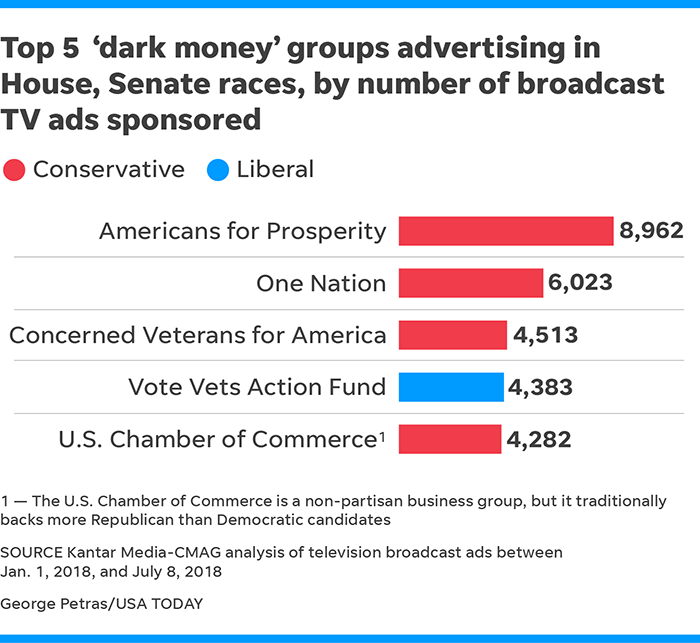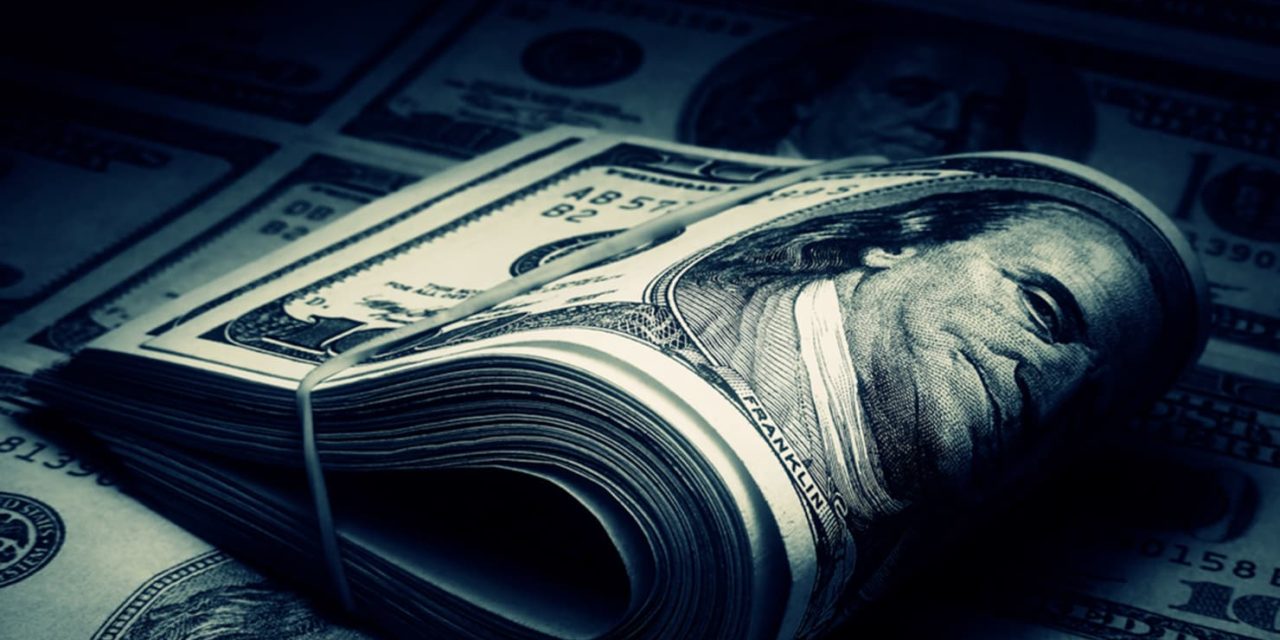Election season openness and transparency has taken a big hit in 2018 as secret donors financed nearly half of television ads that outside groups broadcast this year to influence congressional campaigns.
According to a USA Today analysis of campaign spending from Jan. 1 to July 8, the leading “dark money” out-of-state operators are organizations affiliated with billionaire industrialists Charles and David Koch, whose Koch brothers’ conservative finance network typically plows hundreds of millions of dollars into politics.
Two Koch-affiliated groups account for more than one-quarter of the House and Senate advertising from groups that don’t disclose their donors, according to a tally of 2018 broadcast ads tracked by Kantar Media’s Campaign Media Analysis Group.
Those groups, the libertarian-leaning Americans for Prosperity (AFP) and Concerned Veterans for America, have targeted five Democratic senators up for re-election: Sens. Joe Donnelly of Indiana, Claire McCaskill of Missouri, Jon Tester of Montana, Heidi Heitkamp of North Dakota and Tammy Baldwin of Wisconsin.

Impact in Michigan
In Michigan, the numbers are more mundane, especially by 2018 standards, with undisclosed hundreds of millions of dark dollars expected to be spent across the nation in the coming months.
A liberal group known as Michigan Families For Economic Prosperity has run an estimated $408,000 in advertising so far attacking two Republican congressmen seeking re-election — Reps. Mike Bishop of Rochester and Fred Upton of west Michigan. Because it is a nonprofit, the group does not have to reveal its donors.
In the U.S. Senate race, no dark money has played a role at this point. Incumbent Debbie Stabenow, unopposed in the Democratic primary, has dramatically outspent her two Republican opponents — Sandy Pensler and John James – by a margin of $13 million vs. $7 million for the two GOP contenders combined.
With a month to go before the August primary, the Michigan elections where dark money plays a role is in the campaigns for governor, according to the Michigan Campaign Finance Network (MCFN). Michigan election laws are notorious for giving a free pass to dark money campaigning in state elections.
Across the 2018 political landscape, AFP, a high-profile national conservative group, has spent $2.1 million in dark money on TV ads and mailed literature opposing the candidacy of Democratic gubernatorial frontrunner Gretchen Whitmer, MCFN reported. The group has previously been supported heavily by Charles and David Koch of Koch Industries.
Republican Lt. Gov. Brian Calley, in his bid to succeed term-limited Gov. Rick Snyder, has benefited from a secret-donor group known as Fund for Michigan Jobs. The nonprofit spent $148,000 as of July 2 on pro-Calley ads.
State Attorney General Bill Schuette, the GOP frontrunner for governor, enjoys support from $408,000 worth of TV ads from the Fund for Michigan’s Tomorrows that boosted his candidacy. Again, as a nonprofit, the fund’s donors remain a secret to voters.
In the high-stakes national battle for control of Congress, dark money could play a huge role this year. A recent study found a 26 percent increase in ads by secret-money groups in federal races since the 2014 midterms.
Supreme Court nomination could mean influx of dark money
In addition, the timing of 2018 may mean an explosion in targeted TV ads after President Trump earlier this week announced his Supreme Court nomination of Brett Kavanaugh. Some partisan advocacy groups will be waging an expensive, two-pronged advertising approach: influencing senators on their Kavanaugh confirmation vote while warning voters in certain states about their senator’s leanings on the court vacancy as they head toward re-election.
USA Today found that outsiders trying to influence congressional elections state-by-state have taken an aggressive tact in the lead-up to November.
Outside groups ran nearly 107,000 of the broadcast ads in House and Senate races this year. Organizations identified by USA TODAY as nondisclosing accounted for nearly 47,000 of those ads, about 44 percent. Conservative-leaning groups account for four out of the five biggest secret-money advertisers (see graph).
At the same time, a fight by campaign reform groups to eliminate dark money has also engaged the Koch brothers’ operatives, plus sympathetic elected officials such as Schuette.
Schuette is among six GOP state attorneys general defending Americans for Prosperity in federal court in California, where a legal barrage is underway to force the group to unmask their donors.
Luke Hilgemann, AFP’s national CEO, has cast the fight over undisclosed dark money as a free speech issue. He said two years ago that anonymous AFP funders should be protected from public disparagement by political opponents who disagree with the group on issues such as taxes and safety-net social spending program.
Threats and intimidation aimed at unmasked donors, Hilgemann said, could drive away AFP supporters from funding their group.
He then issued an extraordinary statement about public transparency conflicting with criticism of political views that some consider out of the mainstream.
“The chilling of public discourse,” he said, “is a bad path for the country to go on.”




